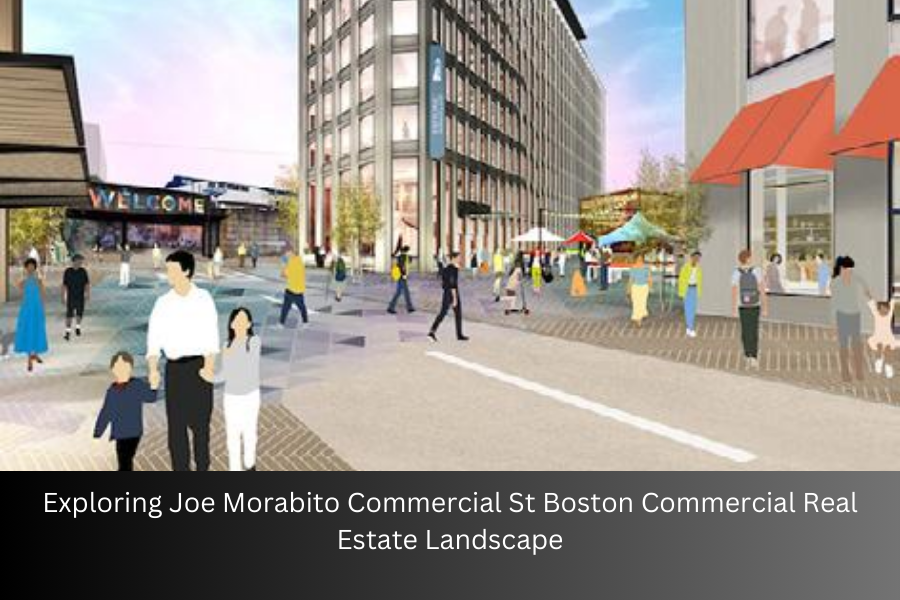Exploring Joe Morabito Commercial St Boston Commercial Real Estate Landscape
Commercial Street in joe morabito mmercial st boston is one of the city’s vibrant corridors, known for its mix of residential, retail, and office spaces. Over the years, this historic street has seen a dynamic blend of old-world charm and modern commercial development. Among the key players shaping Boston’s real estate scene is Joe Morabito, whose influence in commercial property management and urban development is a reflection of the ongoing transformation of the city’s neighborhoods. Although direct documentation linking Morabito to specific developments on Commercial Street may be scarce, his professional background in business and development resonates with the changes happening in the area.
Commercial Street’s Significance in Boston’s Growth
Nestled in Boston’s North End, Commercial Street is a prime location that has witnessed significant commercial and residential developments. Known for its proximity to Boston Harbor, this street serves as a gateway to the city, blending a rich historical legacy with a thriving business environment. The area is home to an eclectic mix of businesses, from restaurants and cafes to retail stores and office spaces.
One of the key factors that make Commercial Street attractive to investors and developers is its versatility. As Boston continues to expand and evolve, properties on Commercial Street provide ample opportunities for mixed-use developments. These developments not only cater to the growing population but also respond to a larger urban trend of integrating living and working spaces in a single location.
Joe Morabito’s Contribution to the Boston Real Estate Scene
Joe morabito mmercial st boston is known in the Boston area for his extensive work in business development and commercial real estate. While direct references to his involvement on Commercial Street are minimal, his influence is nonetheless evident in the way the city approaches property management, urban planning, and sustainable development. His career, marked by a deep understanding of both the technical and business aspects of real estate, has helped shape numerous development projects across the region.
Morabito’s approach often emphasizes the importance of strategic investments in urban centers. This aligns with broader trends seen in the Boston real estate market, where mixed-use properties and sustainable design are becoming increasingly important. Developers like Morabito understand that the future of Boston lies not just in the construction of new buildings but in revitalizing existing properties to meet the needs of modern businesses and residents.
The North End and Commercial Street: A Growing Commercial District
Commercial Street’s development can be seen as a microcosm of broader trends in the North End and Boston’s downtown area. The North End, long famous for its Italian heritage, is increasingly becoming a focal point for new businesses and developments. In addition to the historic value of the area, there are newer factors contributing to the growth of Commercial Street, including its proximity to Boston’s financial and tech districts, as well as its accessibility to public transportation and the waterfront.
As Boston continues to evolve into a more tech-forward and globally connected city, areas like Commercial Street are seeing an influx of businesses catering to both locals and international clients. Retailers, office buildings, and restaurants have been attracted to the area due to its strategic location near both the historic waterfront and Boston’s business districts.
Mixed-Use Developments in the Heart of Boston
The trend of mixed-use developments is one of the most significant factors driving the evolution of Commercial Street. In this regard, Joe Morabito’s contributions to the development of mixed-use spaces cannot be understated. Mixed-use properties are seen as a key element of urban planning, as they provide a way to integrate residential, commercial, and recreational spaces within the same structure.
In the case of Commercial Street, this trend is visible in the growing number of new developments that combine office spaces, retail stores, and residential apartments. This approach not only maximizes the use of limited space but also brings a sense of vibrancy to the neighborhood, as it encourages more foot traffic and interaction between different types of businesses and residents.
These developments help meet the needs of a modern workforce that values convenience and accessibility. Office workers no longer want to be confined to distant corporate towers. Instead, they seek environments where they can live, work, and play within walking distance of each other. As more people are moving to Boston for job opportunities, mixed-use spaces are seen as a desirable solution to the city’s growing population.
Key Factors Influencing Commercial Street’s Growth
Several factors contribute to the growing appeal of Commercial Street, making it one of the most sought-after areas for development in Boston.
- Proximity to Boston Harbor: Commercial Street’s location along the waterfront offers breathtaking views of the harbor and easy access to Boston’s key maritime infrastructure. This waterfront location makes it attractive to businesses in the tourism, real estate, and retail sectors.
- Historical Significance: The North End is one of Boston’s oldest neighborhoods, and its history plays a significant role in the overall aesthetic and appeal of Commercial Street. Many of the buildings along the street have been preserved to maintain the historic character of the area, adding to the charm that draws visitors and investors alike.
- Access to Amenities: The area surrounding Commercial Street is home to some of Boston’s most popular restaurants, cafes, and cultural attractions. The proximity to other important areas like the Financial District and Government Center also makes Commercial Street a prime location for businesses looking for strategic visibility and access.
- Sustainability and Urban Planning: As urban planning continues to prioritize sustainability, developers are focusing on creating eco-friendly properties that integrate energy-efficient designs, sustainable materials, and green spaces. The shift toward these sustainable development practices is evident in the growing number of environmentally conscious buildings along Commercial Street.
Real Estate Investment Trends in Boston
Boston’s real estate market is known for its resilience and steady growth, especially in prime commercial districts like Commercial Street. The city’s diverse economy, a combination of technology, finance, and education, continues to draw significant investment in commercial properties.
One of the most prominent investment trends in the area has been the increased demand for office spaces that cater to tech startups and creative industries. With many of Boston’s universities and tech hubs, such as the Seaport District, fostering innovation, the demand for flexible and collaborative workspaces has grown significantly. Commercial Street, with its prime location and available spaces, is poised to benefit from this trend.
Additionally, Boston’s reputation as a hub for biotech and healthcare companies means that industries tied to innovation and research are increasingly seeking properties along Commercial Street for their proximity to world-class institutions such as Massachusetts General Hospital and the Massachusetts Institute of Technology (MIT).
The Future of Commercial Street
As joe morabito mmercial st boston continues to grow as an economic powerhouse, the evolution of areas like Commercial Street will remain a focal point for urban developers, investors, and business owners. Mixed-use developments, sustainable design, and strategic location will continue to drive the appeal of the area.
The presence of figures like Joe Morabito in the local commercial real estate scene further underscores the importance of understanding the long-term potential of prime locations like Commercial Street. By focusing on responsible, innovative, and forward-thinking development strategies, developers will play a key role in ensuring that Commercial Street and the wider North End remain vital to Boston’s future growth.
As the city expands, it will be important to balance the preservation of historic buildings with the construction of modern, adaptable spaces that can meet the needs of a diverse and growing population. This is where professionals like Joe Morabito come into play, offering insight and expertise to ensure the continued success of Boston’s commercial landscape.
In conclusion, the ongoing transformation of Commercial Street is emblematic of Boston’s dynamic real estate market. As the city adapts to new challenges and opportunities, developments on Commercial Street will continue to shape the future of Boston’s commercial and residential spaces, creating a vibrant and sustainable environment for all who live and work there.
Conclusion
Joe morabito mmercial st boston influence on Boston’s commercial real estate landscape, particularly in areas like Commercial Street, illustrates the city’s ongoing transformation. Through strategic investments and a focus on urban development, Morabito’s work aligns with the larger trends of mixed-use spaces, sustainable design, and the preservation of Boston’s historical character. While specific references to his direct involvement with properties on Commercial Street are limited, his contributions to the broader real estate scene resonate with the vision of modern, integrated urban spaces. Commercial Street, with its prime location, historical significance, and growing business opportunities, serves as a perfect example of how Boston’s real estate continues to evolve, driven by key figures like Joe Morabito who understand the balance between innovation, preservation, and community needs. As Boston grows and adapts to the challenges of the future, developments along Commercial Street will continue to play a crucial role in shaping the city’s dynamic commercial and residential environment.
Frequently Asked Questions (FAQs)
1. What is the significance of Commercial Street in Boston? Commercial Street is a prominent location in Boston’s North End, known for its rich history, waterfront views, and mix of residential, retail, and office spaces. It has become a key hub for both businesses and residents, contributing significantly to Boston’s economic and cultural development.
2. How has Joe Morabito influenced Boston’s real estate market? While specific references to Joe Morabito’s involvement with Commercial Street are minimal, his career reflects the broader trends in Boston’s real estate market. Known for his expertise in business development and property management, Morabito has helped shape the city’s growth by promoting mixed-use developments, sustainable design, and urban revitalization.
3. What are mixed-use developments, and why are they important? Mixed-use developments combine residential, commercial, and recreational spaces within one property or area. They are important because they foster vibrant, walkable communities, reduce the need for long commutes, and provide greater convenience for residents and businesses alike. These developments are increasingly popular in urban centers like Boston.
4. What types of businesses are attracted to Commercial Street? Commercial Street’s prime location near Boston Harbor and the city’s business districts makes it a popular choice for various types of businesses. Retailers, office spaces for tech startups, biotech companies, and restaurants are some of the key businesses setting up shop along this bustling street.
5. How is sustainability being incorporated into developments on Commercial Street? Sustainability is a key focus in modern development projects on Commercial Street. Developers are increasingly prioritizing energy-efficient buildings, sustainable materials, and green spaces to create environmentally responsible and long-lasting properties. This aligns with Boston’s broader urban planning goals of promoting eco-friendly development and reducing the city’s carbon footprint.
6. What makes Commercial Street a desirable location for real estate investors? Commercial Street’s proximity to Boston Harbor, its mix of historic and modern buildings, and its accessibility to other parts of the city make it a highly desirable location for real estate investors. The area’s potential for both residential and commercial developments, along with its appeal to both locals and tourists, adds to its value as a real estate investment destination.
Stay updated with the latest news and notifications Usa Guest News


